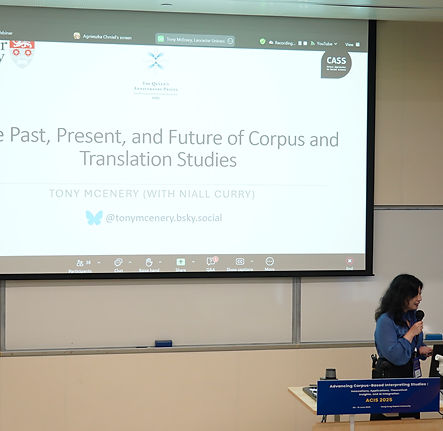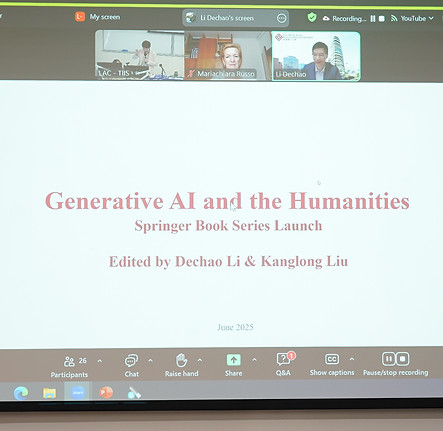
ACIS 2025 Charts the Future of
Corpus-Based Interpreting in the AI Era
Jointly organised by the Academy of Language and Culture, its Department of Translation, Interpreting and Intercultural Studies, the Centre for Translation of Hong Kong Baptist University, and Enter-Link, a language technology R&D start-up based at Hong Kong Science Park, the Advancing Corpus-Based Interpreting Studies (ACIS 2025) symposium was convened with notable success from 9–11 June 2025, recording a total of 916 attendances either in person at Hong Kong Baptist University or online via Zoom and YouTube Live streaming.
Showcasing both academic and cultural diversity, the symposium brought together speakers from around the world—including China, the UK, the US, Italy, Belgium, Spain, Poland, Cameroon, and Oman—to share cutting-edge developments and explore the transformative potential of corpus-based methodologies and AI integration. The symposium programme highlighted nine distinguished keynote and invited sessions, along with 17 presentations delivered across two parallel sessions.
The keynote and invited sessions featured an impressive lineup of distinguished speakers, including Prof. Tony McEnery (Lancaster University), Prof. Wallace Chen (Middlebury Institute of International Studies at Monterey), Prof. Agnieszka Chmiel (Adam Mickiewicz University), Prof. Bart Defrancq (Ghent University), Prof. Mariachiara Russo (University of Bologna), Prof. Defeng Li (University of Macau), Prof. Victoria Lei (University of Macau), Prof. Andrew Cheung (The Hong Kong Polytechnic University), Prof. Dechao Li (The Hong Kong Polytechnic University), Prof. Kanglong Liu (The Hong Kong Polytechnic University), Dr. Tak Ming Wong (Hong Kong Metropolitan University), and Prof. Brian James Baer (Kent State University). These enlightening sessions underscored pioneering ideas into the promising applications of interpreting corpora, leveraging state-of-the-art corpus-based methodologies, and offered valuable insights into the future directions of corpus-based interpreting studies in the context of human-AI collaboration.
The two parallel sessions attracted academics, industry professionals, and research postgraduates to connect and exchange the cutting-edge research in corpus and interpreting studies, focusing on computational corpus-based approaches, corpus design and data management, linguistic features of interpreted text, cognitive processing in interpreting, automatic speech recognition (ASR) technologies, and AI and interpreting.
By highlighting the transformative implications and innovative ideas on interpreting studies and AI integration, this symposium brought to the forefront the broader implications of corpus-based research with pioneering ideas, engaged the corpora developers and researchers with cutting-edge technologies and potential collaborations, and contributed to shaping the future of corpus-based interpreting studies in an increasingly AI-driven world.

Professor Wallace Chen from Middlebury Institute of International Studies at Monterey (4th right), Prof. Bart Defrancq from Ghent University (4 left), Prof. Defeng Li from University of Macau (3 right), Prof. Janice Pan from Hong Kong Baptist University (2 right), Prof. Kanglong Liu from the Hong Kong Polytechnic University (3 left), Prof. Victoria Lei from University of Macau (1 right), and Dr. Anson Wang from the Hang Seng University of Hong Kong (1 left) attend the ACIS 2025 Symposium.

Professor Janice Pan, Chair of the Organising Committee of the ACIS 2025, and also the Director of the Academy of Language and Culture, Faculty of Arts and Social Sciences, and Professor of the Department of Translation, Interpreting and Intercultural Studies at HKBU, delivers a speech at the opening ceremony.

Special guests attending the ACIS 2025 post-symposium seminar include (from right to left): Dr. Jessica Yeung (Hong Kong Baptist University), Professor Stuart Christie (Hong Kong Baptist University), Dr. Robert Neather (Hong Kong Baptist University), Professor Brian James Baer (Kent State University), Professor Janice Pan (Hong Kong Baptist University), and Professor Li Bo (Lingnan University).

Professor Wallace Chen from Middlebury Institute of International Studies at Monterey (4th right), Prof. Bart Defrancq from Ghent University (4 left), Prof. Defeng Li from University of Macau (3 right), Prof. Janice Pan from Hong Kong Baptist University (2 right), Prof. Kanglong Liu from the Hong Kong Polytechnic University (3 left), Prof. Victoria Lei from University of Macau (1 right), and Dr. Anson Wang from the Hang Seng University of Hong Kong (1 left) attend the ACIS 2025 Symposium.






_JPG.jpg)

